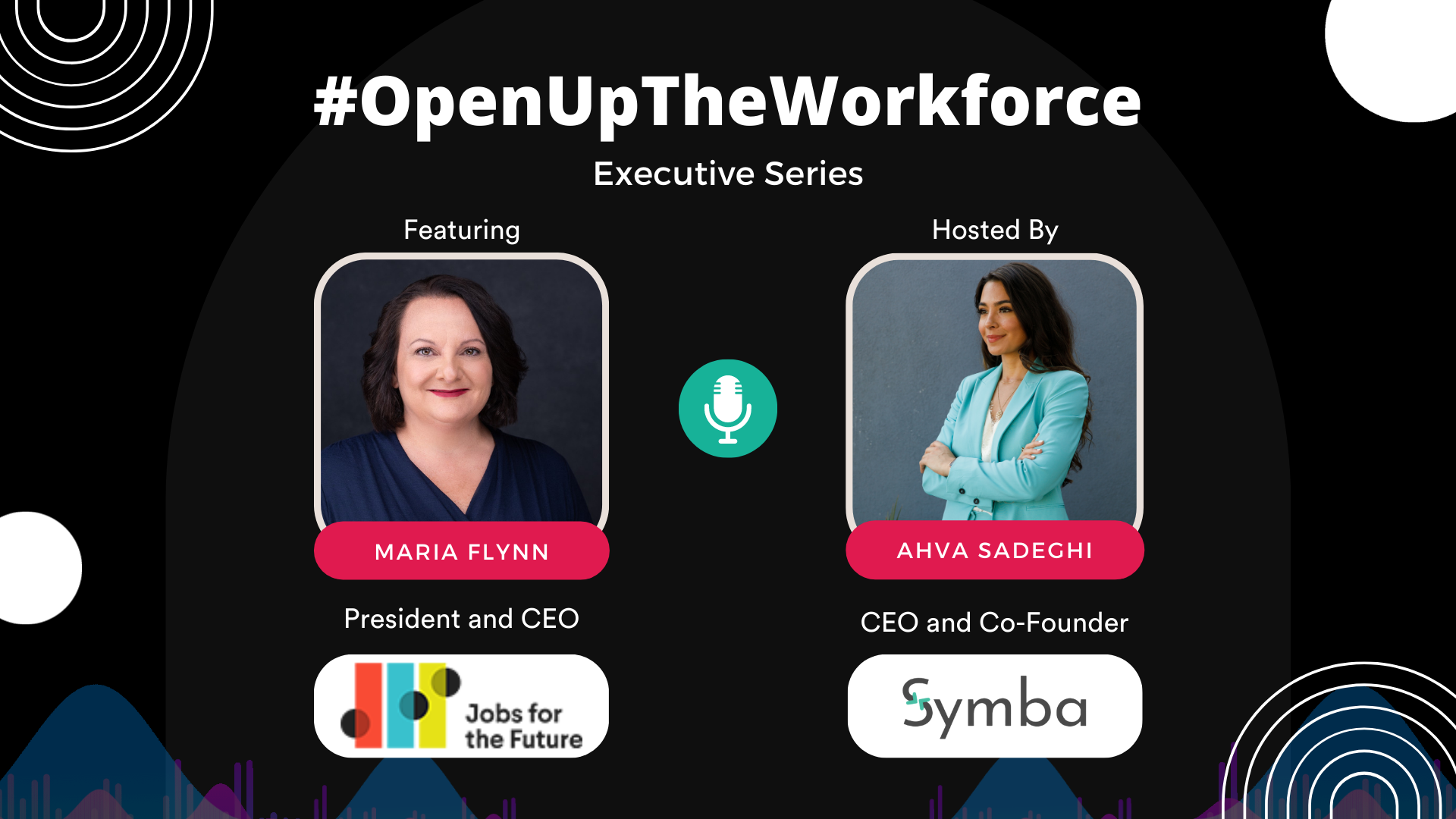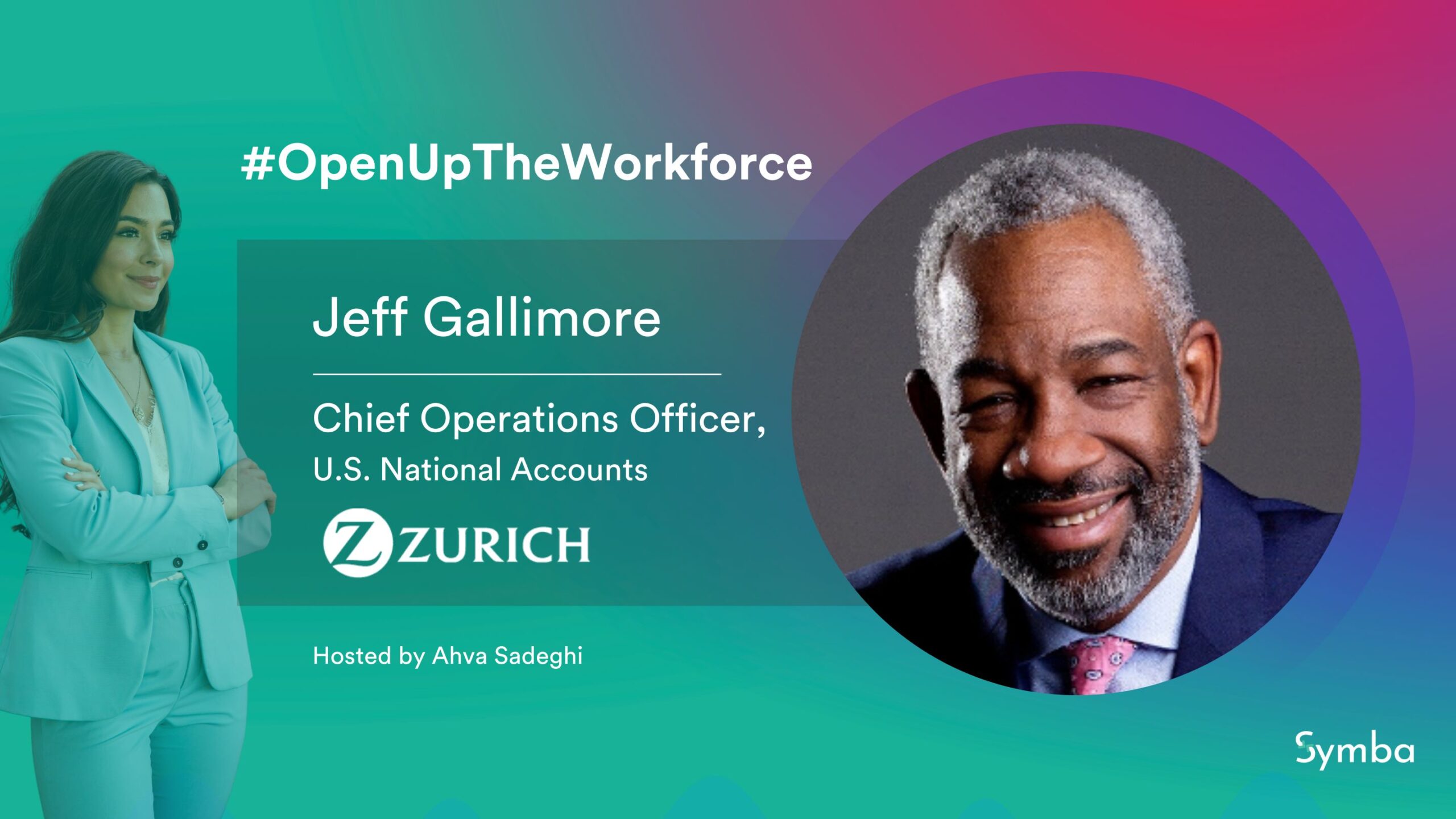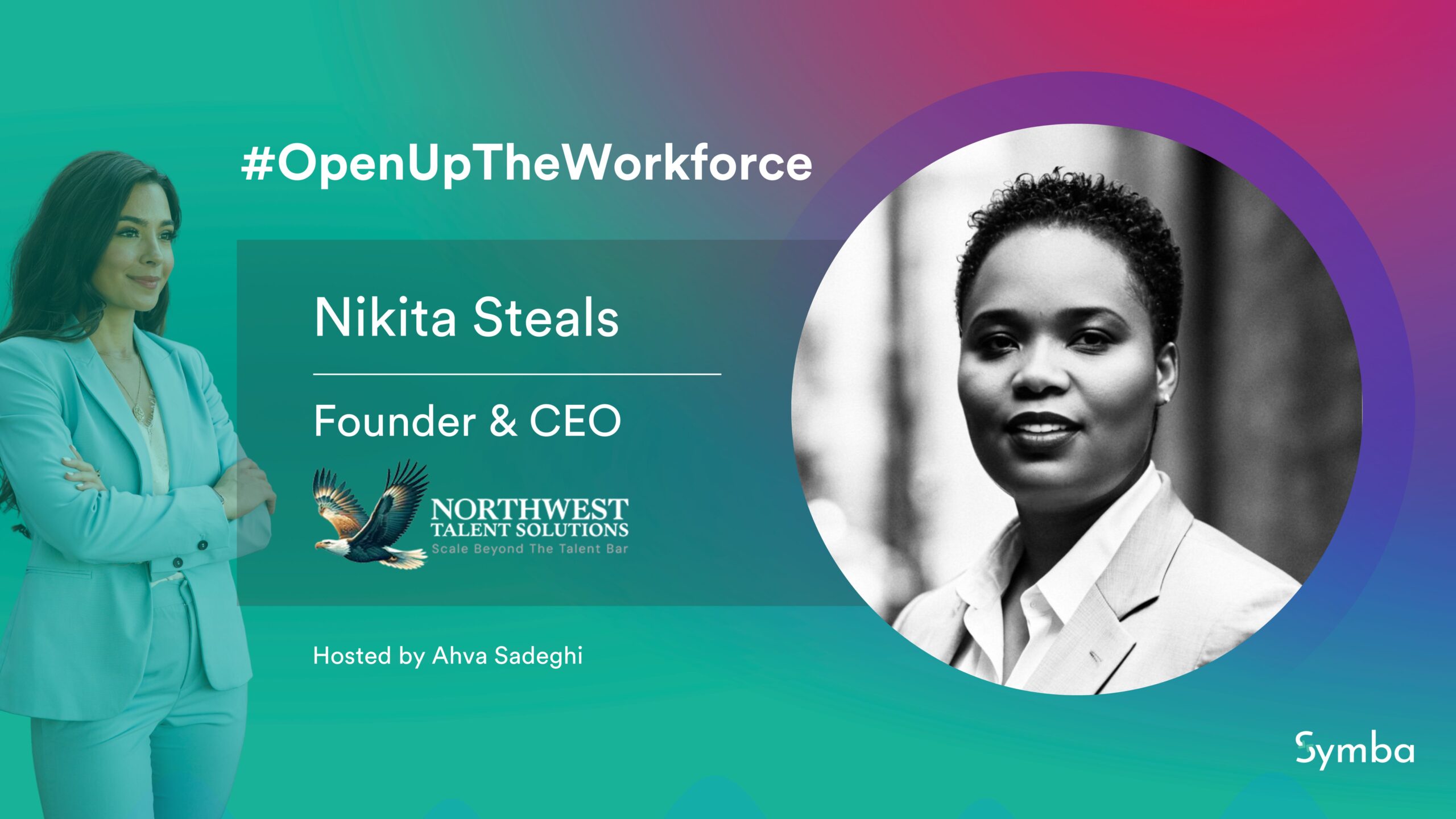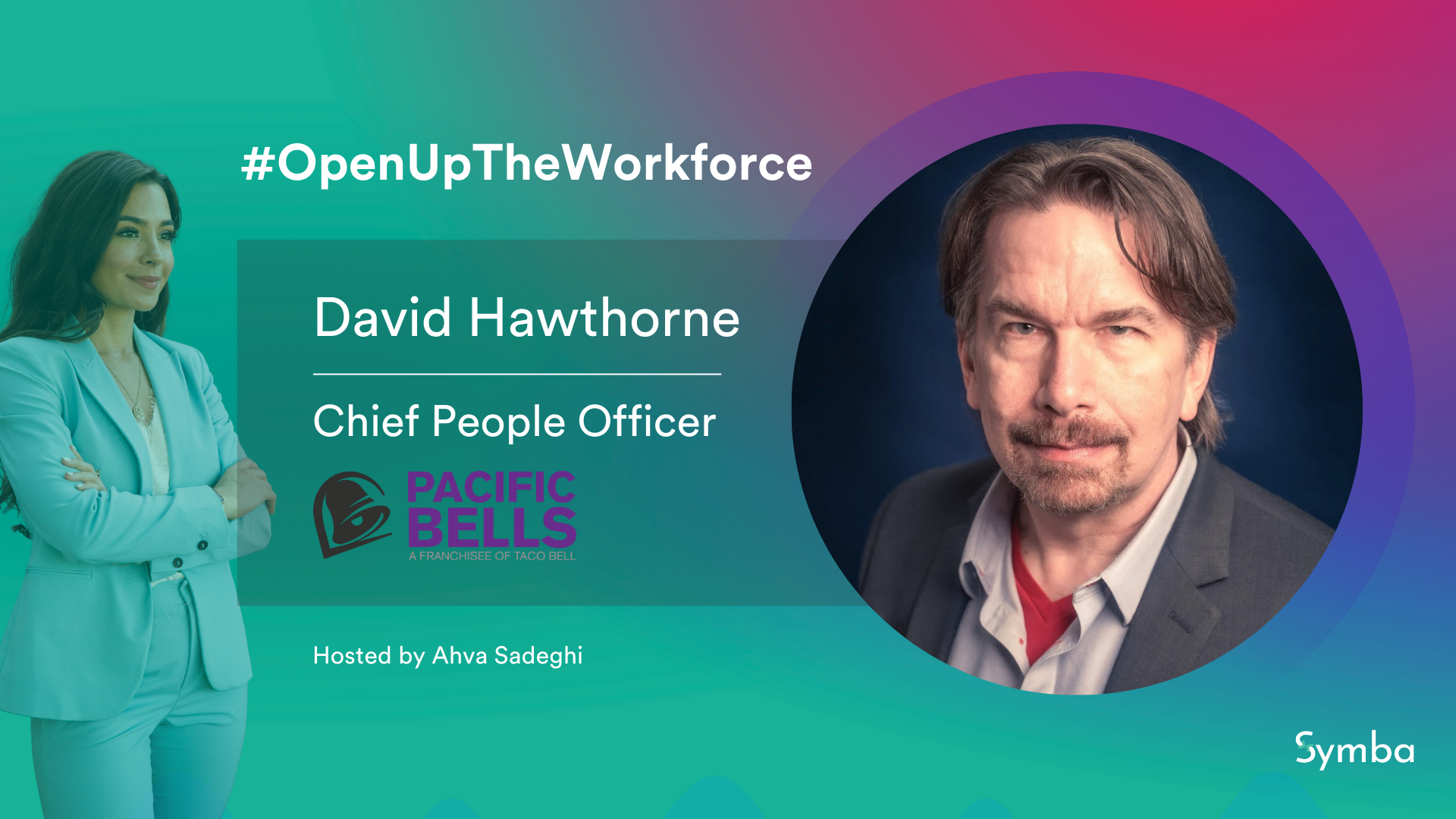Presented by Symba, #OpenUpTheWorkforce interviews feature executives advancing inclusion, diversity, and equity for the future of work. In these short audio-only episodes, we talk with the top about what it takes to develop and implement inclusive processes.
In this episode of #OpenUpTheWorkforce, Ahva had the privilege of interviewing Maria Flynn, the President & CEO at Jobs For the Future (JFF). With a career dedicated to empowering workers and learners, Maria has spearheaded innovative initiatives that bridge traditional systems with disruptive solutions to make it easier for workers and learners to balance their lives, learning, and earnings. In this interview, Maria shares her journey, highlights the importance of partnerships and apprenticeships, and discusses JFF's commitment to diversity, equity, and inclusion. Listen here.
Maria Flynn's career has revolved around the intersection of education and workforce development. Inspired by her father's journey of working multiple jobs while pursuing education, Maria has dedicated herself to finding ways to make it easier for workers and learners to navigate their paths. After working for the U.S. Department of Labor for over 15 years, where she focused on the public workforce system and pathways to good-paying jobs, Maria joined JFF to drive innovative work in education and workforce development. Starting as a Vice President and Senior Vice President, she eventually became the CEO of JFF six years ago. Her journey reflects a passion for balancing education, earnings, and personal well-being.
The Importance of Partnerships to Advance Innovation
Maria highlights the significance of partnerships and innovation in transforming education and workforce systems. Throughout her career, she has witnessed the power of collaborative efforts between traditional system leaders, such as community colleges and workforce boards, and community-based organizations and external disruptors. Recognizing the need to bridge these two worlds, Maria spearheaded the creation of JFF Ventures, an investment arm that supports startups aligned with JFF's mission. JFF’s North Star is to rally education, workforce, and employment changemakers so that in 10 years, 75 million people facing systemic barriers to advancement will work in quality jobs. By investing in innovative solutions, such as Symba, JFF aims to drive positive change in the future of work.
The Impact of Apprenticeships and Diversity, Equity, and Inclusion
Apprenticeships are a key focus area for JFF, and Maria emphasizes their effectiveness in providing a combination of earning and learning opportunities. She underscores the need for comprehensive support, livable wages, and advancement opportunities to ensure inclusive and accessible apprenticeship programs. Maria highlights the importance of building local apprenticeship ecosystems between employers, education providers, workforce boards, organized labor, and regional intermediaries to scale these opportunities within communities. However, she also acknowledges the existing disparities in the apprenticeship landscape, like the underrepresentation of women and racial minorities in registered apprenticeships. Maria names some statistics, “Women make up, you know, nearly 50 percent of the workforce, only about 13 percent of apprentices are female. And then when you look at the number of Black workers in the labor market, more broadly, Black apprentices are 30 percent less likely than White apprentices to complete their program.” JFF is committed to addressing these inequities through its Diversity, Equity, and Inclusion (DEI) initiatives.
Measuring Impact and ROI
Measuring the impact and return on investment (ROI) of workforce development initiatives is crucial. Maria acknowledges the challenge and the necessity of comprehensive data, metrics, and narratives to sustain momentum and drive change. She shares that while the US government provides a lot of funding for workforce development, the investments often lack sufficient funding for evaluation and dissemination, hindering practitioners' ability to learn and innovate. JFF actively invests in equitable data practices and transparent recruitment strategies to track progress and demonstrate the transformative power of its initiatives.
Diversity, Equity, and Inclusion: An Inside-Out Approach
JFF not only champions diversity, equity, and inclusion in their external programs but also within their own organization. As the President and CEO of JFF, Maria evaluates the impact and success of internal programs such as the paid internship program. The program, now in its third year, is fully remote and provides structured internships across various departments within JFF. Through initiatives like lunch and learn sessions with external speakers, JFF fosters a supportive and engaging environment for interns. Maria mentions they track the diversity of their hires and retention by demographic groups; “we currently have about 320 staff, 44 percent of which are employees of color. At the leadership level, that percentage is a little higher, 47 percent. We have a goal of getting those numbers, you know, to 50 or above.” By continuously monitoring and adapting these programs, JFF ensures their effectiveness and aligns them with the organization's mission and values.
Maria values the feedback and input of her staff, including the DEI advisory committee, in shaping policies and practices. Centering staff voices and experiences helps JFF drive meaningful change and create a more inclusive work environment. Along the same vein, JFF's employee resource groups (ERGs) provide support and space for underrepresented voices to be heard.
What do leaders need to do to #OpenUpTheWorkforce?
Maria recommends reviewing JFF’s impact employer framework that offers actionable steps to attract, develop, and retain talent while prioritizing the social and economic well-being of employees. More specifically, she encourages all employers who are in a position to do so to consider changing their hiring requirements. JFF eliminated educational requirements from all of their job postings to make the hiring process more equitable, utilizing a skills-based approach. For example, they include anonymized performance tasks as part of their recruiting strategy. Maria concludes, “I think there are relatively easy steps that all employers can take that can really make a difference in terms of who you are recruiting into your organization and who you put on a path to opportunity.”
Maria Flynn's interview reveals her deep commitment to improving education and workforce systems. Her extensive experience and dedication to partnerships, apprenticeships, data-driven practices, and diversity, equity, and inclusion are shaping the landscape of workforce development. JFF is playing a vital role in building a future of work that is inclusive, empowering, and transformative.
About Maria Flynn
Maria Flynn is president and CEO of JFF, a national nonprofit that drives transformation in the American workforce and education systems.
Maria’s commitment to JFF’s vision of equitable economic advancement for all and her leadership in workforce policy have made her a national authority on the future of work, the role of technology in the labor market, career pathways for learners and workers underserved by the education and workforce systems, and employer engagement.
As CEO, she has strengthened JFF and overseen a period of unprecedented growth as it has evolved into a leading-edge organization.
Before joining JFF in 2007, she was a member of the federal government’s Senior Executive Service. In the U.S. Department of Labor’s Employment and Training Administration, she oversaw the development of policies for training programs, supervised the agency’s research and evaluation strategy, and managed the development of its $12 billion annual budget.
With three decades of experience and a reputation as an expert on workforce development, Maria is frequently invited to speak at national events such as the Milken Institute Global Conference and Fortune, Aspen, and Atlantic events, and is regularly interviewed by major news organizations including The Wall Street Journal, The New York Times, and Fast Company. Respected for her policy insights, Maria has testified on workforce system reform before the U.S. Senate Committee on Health, Education, Labor, and Pensions. She was named to the Forbes 50 Over 50: Impact list for 2022, which features influential women in the business, legal, philanthropic, and nonprofit sectors and beyond.
.
.
.
You can view other episodes of #OpenUpTheWorkforce here. Are you an executive leader increasing access to jobs and wealth creation? Request to be featured and show us how you #OpenUpTheWorkforce.





